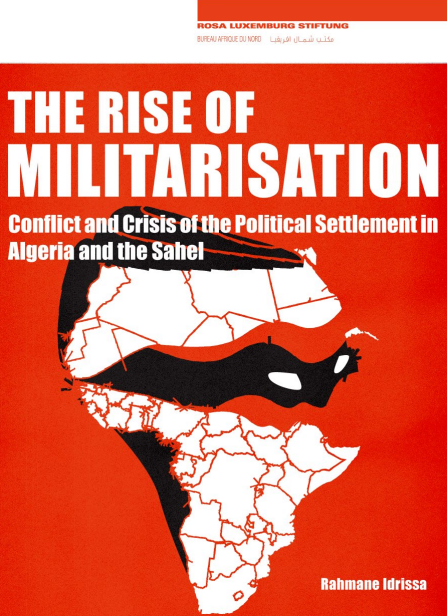The rise of militarisation - Conflict and crisis of the political settlement in Algeria and the Sahel
 The current conflicts in the Sahel (comprising jihadist insurgencies in Mali, Burkina Faso, and Niger, and a Tuareg rebellion in Mali) can be traced to key influences from Algeria and Libya. While rooted in local issues, these conflicts would not have unfolded as they did without the impact of these two North African countries. Libya, under Gaddafi, had long managed Sahelian instability by supporting Sufi Islam and restraining Tuareg separatists. However, the collapse of Gaddafi’s regime in 2011 removed these stabilising mechanisms, leading to a rapid escalation of unrest, particularly in Mali. Algeria’s influence, though less recognised, is equally critical. Its own internal conflict, beginning in 1992, shaped the methods and ideologies of Sahelian Islamist groups. The Sahel has mirrored Algeria’s shift toward militarised governance following a failed democratic experiment between 1988 and 1992. This paper argues that Algeria’s unresolved political crisis and the export of its conflict dynamics have deeply influenced the structure and progression of violence in the Sahel. Through historical analysis, it examines the Algerian conflict’s origins and consequences, and applies this framework to understand the breakdown of democratic governance and rise of militarisation in the Sahel, ultimately drawing parallels and lessons from Algeria’s trajectory.
The current conflicts in the Sahel (comprising jihadist insurgencies in Mali, Burkina Faso, and Niger, and a Tuareg rebellion in Mali) can be traced to key influences from Algeria and Libya. While rooted in local issues, these conflicts would not have unfolded as they did without the impact of these two North African countries. Libya, under Gaddafi, had long managed Sahelian instability by supporting Sufi Islam and restraining Tuareg separatists. However, the collapse of Gaddafi’s regime in 2011 removed these stabilising mechanisms, leading to a rapid escalation of unrest, particularly in Mali. Algeria’s influence, though less recognised, is equally critical. Its own internal conflict, beginning in 1992, shaped the methods and ideologies of Sahelian Islamist groups. The Sahel has mirrored Algeria’s shift toward militarised governance following a failed democratic experiment between 1988 and 1992. This paper argues that Algeria’s unresolved political crisis and the export of its conflict dynamics have deeply influenced the structure and progression of violence in the Sahel. Through historical analysis, it examines the Algerian conflict’s origins and consequences, and applies this framework to understand the breakdown of democratic governance and rise of militarisation in the Sahel, ultimately drawing parallels and lessons from Algeria’s trajectory.
Read the full article in English, or in French.
The article is a Rosa Luxemburg Stiftung/North Africa Office Paper.
Author(s) / editor(s)
About the author(s) / editor(s)
 Abdourahmane (Rahmane) Idrissa is a political scientist fast embracing history. His doctorate in political science, with a concentration on democratisation and political Islam in Africa, was obtained at the University of Florida. Idrissa’s research expertise ranges from issues of states, institutions and democratisation in Africa to Salafi radicalism in the Sahel and current projects on the history of state formation in Africa, with a focus both on the modern (Niger) and premodern eras (Songhay).
Abdourahmane (Rahmane) Idrissa is a political scientist fast embracing history. His doctorate in political science, with a concentration on democratisation and political Islam in Africa, was obtained at the University of Florida. Idrissa’s research expertise ranges from issues of states, institutions and democratisation in Africa to Salafi radicalism in the Sahel and current projects on the history of state formation in Africa, with a focus both on the modern (Niger) and premodern eras (Songhay).
Before joining the ASCL, Idrissa has founded and run EPGA, a think tank in political economy in Niger, training students and coordinating projects based on methodologies of political economy analysis that focused on migration, youth employment and demography. In recent years, EPGA has worked in partnership with Clingendael on projects on migration, security issues and traditional governance in the Sahel borderlands.
Idrissa is also associated with the Niamey based social science laboratory LASDEL and is on the editorial board of the African Studies Quarterly, at the University of Florida.

